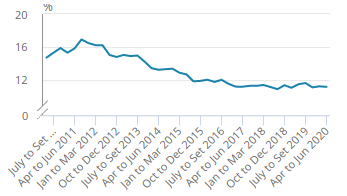The ONS have released the latest data on young people not in employment, education or training (NEET), covering the quarter from April – June. You can access it here.
This dataset includes those who are in any form of part-time education or training and so the number of young people who are NEET is slightly lower than estimates from the monthly ONS Labour Market Overview that only includes those in full-time education or training.
The most notable shift is the movement of young people who are NEET from unemployed status to economically inactive -a 1.7 percentage point increase in the number of young people not looking and/or are unavailable for work. The overall number of young people who are NEET has fallen.
The headlines
- There are currently 765,000 young people (16-24 years old) who are NEET this is 6,000 fewer than the last quarter and 28,000 fewer than a year earlier.
- The percentage of young people who are NEET is 11.1%; the proportion was down by 0.1 percentage points from the last quarter and down 0.3 percentage points compared to a year earlier.
- 39.9% of young people who are NEET are unemployed (they have looked for work in the past four weeks and are available to start work within the next two weeks).
- 60.1% of young people who are NEET are economically inactive (either have not looked for work in the past four weeks and are not available to start within the next two weeks)
Our Thoughts
The statistics released today do not tell a negative story and as much as this is welcomed it must be treated with caution. Previous data and research tell us that young people are the most impacted group in terms of employment opportunities and projected earnings and are often left scarred from time spent unemployed during a recession. The UK has officially moved into a recession and unemployment levels are set to soar higher than in the 1980’s; young people must be our priority.
The Kickstart scheme announced by the government last month aims to address this but more needs to be done to ensure a generation of young people are not left to drift further away from the labour market in a time when support getting back into work is most needed. The longer someone is employed, the further they move away from the labour market, with aging skills a common problem.
This may become increasingly difficult given the challenges brought on by the summer exam results. Some young people may find themselves out of a place in education and training and competing in a tough labour market against those with more experience and higher qualifications. On the flipside with so many pass rates, the quality or individuality of the advice could be hindered by the availability of places in further and higher education and the availability of apprenticeships and traineeships.
We have been working hard to build a fantastic digital resource for all young people, with our careers hub and young professional training programme helping young people to identify and build key skills required in the workplace. We are also launching our Good Youth Employment Charter that looks to ensure employers are youth friendly, recognising young people have vast, untapped potential and may not be the ‘perfect’ employee immediately out of education.
We continue to work in close partnership with government departments and the Youth Employment Group to ensure that every young person is given the opportunity to reach their potential.


 This line graph plots out the percentage of young people who are NEET between June 2010 and June 2020. With the peak occurring in June 2011, the percentage of young people who are NEET has been relatively flat since 2017.
This line graph plots out the percentage of young people who are NEET between June 2010 and June 2020. With the peak occurring in June 2011, the percentage of young people who are NEET has been relatively flat since 2017.









